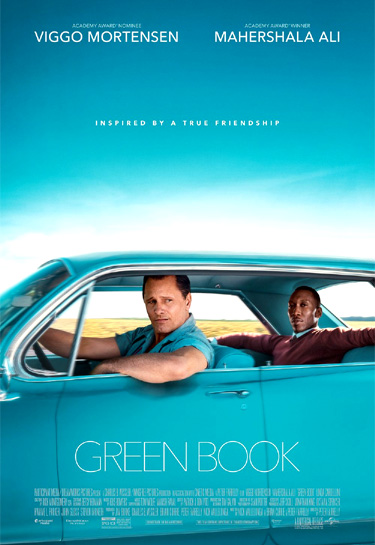2018
The winner is listed first, in CAPITAL letters.
Filmsite's Greatest Films
of 2018
|
Best Picture
|

GREEN BOOK (2018)
|

Black Panther (2018)
|

BlacKkKlansman (2018)
|

Bohemian Rhapsody (2018)
|

The Favourite (2018)
|

Roma (2018)
|

A Star Is Born (2018)
|

Vice (2018)
|
|
|
|
Best Animated Feature Film
|

SPIDER-MAN: INTO THE SPIDER-VERSE (2018)
|

Incredibles 2 (2018)
|

Isle of Dogs (2018)
|

Mirai (2018, Jp.)
|

Ralph Breaks the Internet (2018)
|
Actor:
RAMI MALEK in "Bohemian Rhapsody," Christian Bale in "Vice," Bradley
Cooper in "A Star Is Born," Willem Dafoe in "At
Eternity's Gate," Viggo
Mortensen in "Green Book"
Actress:
OLIVIA COLMAN in "The Favourite," Yalitza Aparicio
in "Roma," Glenn Close in
"The Wife," Lady
Gaga in "A Star Is Born," Melissa McCarthy in "Can
You Ever Forgive Me?"
Supporting Actor:
MAHERSHALA ALI in "Green Book," Adam
Driver in "BlacKkKlansman,"
Sam Elliott in "A Star Is Born," Richard E. Grant
in "Can
You Ever Forgive Me?," Sam Rockwell in "Vice"
Supporting Actress:
REGINA KING in "If Beale Street Could Talk," Amy
Adams in "Vice," Marina
de Tavira in "Roma," Emma
Stone in "The
Favourite," Rachel Weisz in "The Favourite"
Director:
ALFONSO CUARON for "Roma," Yorgos
Lanthimos for "The Favourite," Spike Lee for "BlacKkKlansman," Adam
McKay for "Vice," Pawel Pawlikowski for "Cold
War"
 The
Academy faced a few pre-Oscar problems before the announcement
of its nominations for the 2018 season on January 22, 2019. There
had been a growing backlash to a number of films nominated for
Best Picture (the rules now allowed up to ten films to be nominated
in the category), especially when there was usually no clear-cut
favorite in recent years. The Academy also postponed its announced
proposal to add an "achievement
in popular film" Oscar category - obviously an effort to increase
audience share (and boost sagging ratings and declining viewership)
and to be more inclusive -- parallel to the Academy's
move to vastly expand the diversity of its membership. It was a strange
idea that blockbuster box-office results could become the new
criteria for a 90-year-old award reportedly given on merit. In
fact, the new category might confuse the Best Picture race for both
a worthy big-studio, crowd-pleasing blockbuster and Best Picture
contender (such as Black Panther or A Star is Born). The
Academy faced a few pre-Oscar problems before the announcement
of its nominations for the 2018 season on January 22, 2019. There
had been a growing backlash to a number of films nominated for
Best Picture (the rules now allowed up to ten films to be nominated
in the category), especially when there was usually no clear-cut
favorite in recent years. The Academy also postponed its announced
proposal to add an "achievement
in popular film" Oscar category - obviously an effort to increase
audience share (and boost sagging ratings and declining viewership)
and to be more inclusive -- parallel to the Academy's
move to vastly expand the diversity of its membership. It was a strange
idea that blockbuster box-office results could become the new
criteria for a 90-year-old award reportedly given on merit. In
fact, the new category might confuse the Best Picture race for both
a worthy big-studio, crowd-pleasing blockbuster and Best Picture
contender (such as Black Panther or A Star is Born).
In addition, there was a controversy over the hosting
position after years-old homophobic comments by the Academy's pick
for host, comedian Kevin Hart, caused him to step down after he
was allegedly asked to apologize. Although it had been considered
a major career boost for the selected host, the high-profile position
had become increasingly unpopular, due to criticism that most of
the past hosts were white males from late night talk shows, or
that the thankless position had become highly irrelevant, unnecessary
or outdated in today's varied entertainment programming.
The eight nominated
BP films for 2018 had some of the best overall box office totals
in many years. At the time of the nominations, 2018 Best Picture
nominees had a total of $1.26 billion (domestic) revenue, due to
the top three box-office hits: Black
Panther (at $700.5 million), A Star is Born ($204.8
million, and $211 million by late February), and Bohemian
Rhapsody (at
$202.5 million, and $213 million at the time of the awards), the
2nd highest total in recent Oscar history. Only Best Picture nominees
in 2009 (ten movies) at the time of the nominations had a higher
total, $1.51 billion (domestic), due mostly to Avatar
(2009), Up (2009), and The Blind Side (2009).
By the time of the awards, the BP nominees had reached a total
of $1.32 billion (domestic) revenue.
The
efforts of the Academy to promote diversity also led to a few of
the eight Best Picture nominees prominently featuring LGBTQ characters
(Bohemian
Rhapsody, The Favourite, and Green Book), and
there was also a strong international showing (especially among
the Best Director nominees). It was remarkable that Peter Ramsey
became the first black director to win Best Animated Feature Film: Spider-Man:
Into the Spider-Verse.
The picks for Best Picture for 2018 included
eight films (out of a possible total of ten), many of which possessed
two crucial qualities - they were mostly pleasing box-office hits
that also had terrific critical reviews. Three
of the eight nominated films were about the subject of race. For
the second time since the Academy expanded the Best Picture lineup
in 2009, every single Best Picture
nominee won at least one Oscar! (This feat also happened in 2014).
The
Best Picture winner was Green Book, un-nominated director
Peter Farrelly's, co-writer Nick Vallelonga's and Universal's controversial
and polarizing 60's race-relations biopic (with 5 nominations and
three wins for Best Supporting Actor, Best Original Screenplay, and
Best Picture), with story parallels to Best Picture winner Driving
Miss Daisy (1989).
The film's title was a reference to a guidebook that listed
Southern restaurants, hotels and gas stations that would serve
black people in the 60s. It told about a road-trip tour
in a teal Cadillac through the Jim-Crow American South, taken by
African-American classical pianist Dr. Don Shirley (Mahershala Ali)
and his racist, working class, New York City-born chauffeur-driver
Tony 'Lip' Vallelonga (Viggo Mortensen). The two eventually developed
a long-lasting friendship. In terms of box-office (domestic) revenue,
on a budget of $23 million, it had a total of only $69.6 million
at the time of the Oscar awards. This marked only the 5th time in
Oscar's history that the director of the top film, Peter Farrelly,
was not nominated for Best Director.
[Note: A coincidental sidenote:
Best Picture contender-director Spike Lee's BlacKkKlansman,
that lost out to Green Book, slightly resembled competition
from 29 years earlier. Spike Lee's incendiary film Do the
Right Thing (1989)
was nominated in two categories (Best Original Screenplay
for Spike Lee, and Best Supporting Actor for Danny Aiello) - without
a Best Picture or Best Director nod, and it lost both bids.
One of its competitors in the same year was the eventual Best Picture
winner, Driving
Miss Daisy (1989), with four Oscars from its nine nominations.]
The other nominees in the category (in descending
order of wins):
- 20th Century Fox's musical biopic Bohemian
Rhapsody (with 5 nominations, and four wins for Best Sound
Editing, Best Sound Mixing, Best Film Editing and Best Actor),
about flamboyant rock star Freddie Mercury (Oscar winner Rami
Malek) of the legendary rock band Queen, climaxing with the
group's appearance at the Live Aid (1985) concert - a flawed
director-less film (un-nominated Bryan Singer was dismissed
from filming after allegations of sexual abuse, and the film
was finished by Dexter Fletcher) with mixed reviews; it became
the highest-grossing musical biopic and gay/lesbian film of
all-time (domestic) at $203.1 million
- Netflix's and Alfonso Cuarón's moving 1970s,
grim Spanish-language period-piece Roma (Mex/US) (with
10 nominations, including two acting nominations, and three
wins for Best Cinematography (Cuaron), Best Director, and Best
Foreign Language Film), a foreign language entry filmed in black
and white from Mexico; as predicted, it was the winner of Best
Foreign Language Film (the first from Mexico to accomplish the
feat); it told about the daily life of a working-class family in
the year 1971 through the eyes of its domestic maid
[Note: The film's 10 nominations tied it with Crouching Tiger,
Hidden Dragon (2000, China/US/HK/Taiwan) for the most nominations
ever received for a Foreign Language film. Cuaron's film was the first Netflix
project to be nominated in the Best Picture category. Roma was
only the 11th non-English-language film ever nominated for Best
Picture. Cuaron's win for Best Cinematography made
him the first director to win the Oscar for shooting his own film.]
- Disney's/Marvel's and director Ryan Coogler's
superhero film Black Panther (with 7 nominations mostly
in technical categories, including three wins for Best Costume
Design, Best Production Design and Best Original Score), with
wide critical acclaim and box-office popularity (unlike the previous
year when Patty Jenkins' DC comic-book movie Wonder Woman
(2018) was shut out of the race); it was the highest-grossing
(domestic) film of 2018, and it was Marvel's first black
superhero standalone film; it told about the conflict that developed
between King T'Challa (Chadwick Boseman) of the reclusive, technologically-advanced
(and fictional) African nation of Wakanda, who as the Black Panther,
fought off challenges to his rule by teaming up with CIA agent
Everett K. Ross (Martin Freeman) and members of the all-female
special forces of the Dora Milaje, to combat the misguided, villainous,
anti-isolationist challenger Erik 'Killmonger' Stevens (Michael
B. Jordan).
[Note: Black Panther became the first superhero
movie to be nominated for Best Picture. The domestic box-office total
for the superhero film, $700.5 million, was virtually the same as
the domestic total made by all nine of the Best Picture nominees
in the years 2016 and 2017! However, the entire cast of the film
failed to receive any acting nominations as did its director. It
was an historic achievement that a film in Marvel's
Cinematic Universe had now won its first three Oscars
- and two were also exceptional. The
winner in the category of Best Production Design, Hannah Beachler,
became the first African-American to win in the category. And the
winner for Best Costume Design, Ruth Carter, was also the first black
person to win the Oscar in her category.]
- director Yorgos Lanthimos' and Fox Searchlight
Pictures' UK/US period-piece melodrama The Favourite (with
10 nominations and only one win for Best Actress), a dark
and ascerbic chronicling of intrigue (and sex) in the court of
the ailing Queen Anne (Best Actress winner Olivia Colman),
the last Stuart monarch during her early 18th century reign in
England, involving two rival cousins vying to be court 'favourites':
confidante, secret lover and close friend Lady Sarah Churchill
(nominated Rachel Weisz) and newly-arrived charming, ambitious
yet fallen servant Abigail Hill (nominated Emma Stone) who also
vied for power and prestige
- actor/director Bradley Cooper's (his directorial
debut film) and Warner Bros.' retelling of the romantic backstage
musical A Star is Born (with 8 nominations, and only one
win for Best Original Song "Shallow"), a major blockbuster and
tragic love story about successful musician and country singer
Jackson 'Jack' Maine (Best Actor nominated Bradley Cooper) and
unknown, struggling singer Ally (Best Actress nominated Lady Gaga)
who would soon overtake him in the spotlight; it was the fourth
version of the oft-filmed story
- writer/director Adam McKay's
and Annapurna Pictures' highly-critical biopic Vice (with
8 nominations, and one win for Best Makeup and Hairstyling),
about the machinations of the powerful VP Dick Cheney (Best Actor
nominated Christian Bale) to President George Bush (Sam Rockwell),
and his interactions with his wife Lynne Cheney (Best Actress
nominated Amy Adams)
- director Spike Lee's and Universal's (Focus Features)
white-supremacist critique and period drama BlacKkKlansman (with
6 nominations, and one win for Best Adapted Screenplay), a Grand
Prix-winning Cannes entry and summer hit, based upon the true story
of African-American police officer Ron Stallworth (John David Washington)
in Colorado Springs who successfully infiltrated (via phone) a
local chapter of the Ku Klux Klan, led by David Duke (Topher Grace),
while his secretly-Jewish associate Detective Philip 'Flip' Zimmerman
(nominated Adam Driver) posed as him to attend KKK meetings and
join the Klan. [Note: The Best Adapted Screenplay Oscar was Spike
Lee's first competitive Oscar win in over three decades.]
The nominees for Best Director included three
non US-born directors, no female nominees, and one major surprise
nominee [Note: It
was rare that two directors of Foreign Language films were nominated
together in this category, something that had happened only
once before in Oscar history, in 1976.]
The winner in the category
was 57 year-old Mexican-born Alfonso Cuarón
(with his second Best Director nomination and 10th overall, with
one previous win), for Roma (Mex./US). [Note:
Cuaron's Best Director win was his second victory in the
category in five years - he previously won Best Director for Gravity
(2013). With his Best Director win for Roma (2018),
Cuarón became the first person to win Best Director for
directing a foreign-language film. For Roma, Cuaron received
a total of four individual nominations: Best Original Screenplay,
Best Director (win), Best Cinematography (win), and Best Picture
- thereby tying the record of most decorated Oscar nominee ever
for the same film in the same year, with previous nominees Orson
Welles (for Citizen
Kane (1941)) and Warren Beatty (twice for Reds (1981) and Heaven
Can Wait (1978). With his two wins, Cuaron now possessed
four Oscars.
Cuaron's win also marked the fifth time in six years
that a Mexican filmmaker had taken the director's prize.]
The other four nominees in the category included:
- 44 year-old Greek director Yorgos Lanthimos (with
his first Best Director nomination and 3rd overall), for The
Favourite
- 61 year-old Spike Lee (with his first Best Director
nomination and 5th overall), for BlacKkKlansman
[Note: Lee became the sixth African-American nominated
as Best Director]
- 50 year-old Adam McKay (with his second Best Director
nomination and fifth overall), for Vice
[Note: McKay was previously nominated as Best Director for The
Big Short (2015), and won Best Adapted Screenplay for the film]
- 61 year-old Polish-born Pawel
Pawlikowski (with his first Best Director nomination) for the sad and
joyless drama Cold
War (Pol.) (aka Zimna Wojna),
a black and white non-English language film set in both Poland and
France - about pretty, blonde singer Zula (Joanna Kulig) who
fell into a destructive relationship with handsome, charismatic
pianist and conductor Wiktor (Tomasz Kot) in the aftermath of WWII
(during the late 1940s through the 1960s)
[Note: Pawlikowski previously won Best Foreign Language Film for Ida
(2013, Pol.), awarded in 2014 (it was the sole Polish winner in
the category). Cold
War was
the first Polish-speaking
film nominated in one of the top eight categories, and it was the
eleventh Best Foreign Language Film nominated for Poland.]
Among the 20 nominees in the four acting categories,
five were previous winners, and nine were first-time nominees.
There were two African-Americans (in supporting categories who
both won!), and two nominated Latina actresses - significant milestones.
For the first time,
three of the four acting category Oscar wins went to actors of
color, and three of the four wins went to performers in LGBT movies.
The winner in the Best Actor category was
37 year-old Rami Malek (with his first nomination
and first win) for his role as AIDS-suffering lead singer Freddie
Mercury (lip-synching) of the legendary and iconic rock band Queen,
in Bohemian
Rhapsody. Arab-American Rami Malek (of
Egyptian descent) became the first Arab American to win the Best
Actor Oscar.
The other four nominees in the category included:
- 44 year-old UK-born Christian Bale (with his fourth
career nomination, including one Oscar win), for his transformed
role as Dick Cheney, the ruthless, controversial and powerful
VP to President George Bush (Sam Rockwell), in writer/director
Adam McKay's and Annapurna Pictures' biopic Vice
[Note: Bale's
first Best Actor nomination was for American Hustle (2013),
and he had two Best Supporting Actor nominations: The
Fighter (2010) (win) and The
Big Short (2015)]
- 44 year-old Bradley Cooper (with his fifth nomination)
for his role as aging, hard-drinking country star Jackson 'Jack'
Maine, who helped rising ingenue singer Ally (co-star Lady Gaga)
to a skyrocketing career and eventually married her, while his
own life fell apart (and ultimately led to suicide) due to substance
abuse, in A
Star is Born
[Note: Cooper's previous acting nominations included
two other Best Actor nominations: Silver Linings Playbook
(2012) and American Sniper (2014), and one for Best
Supporting Actor for American Hustle (2013)]
- 63 year-old Willem Dafoe (with his fourth nomination,
and no wins), a surprise underdog nomination for his role as
struggling, 19th century mentally-ill painter Vincent Van Gogh,
in director Julian Schnabel's At
Eternity's Gate
[Note: Dafoe's three other nominations were for Best Supporting Actor:
Platoon (1986), Shadow of the Vampire (2000), and The
Florida Project (2018)]
- 60 year-old Viggo Mortensen (with his third Best
Actor nomination, and no wins) for his role as Tony 'Lip' Vallelonga,
a crude-talking Italian-American New Yorker, bodyguard and chauffeur
employed to drive African-American
classical pianist Dr.
Don Shirley (Mahershala Ali) around the Deep South in the 1960s
for a concert tour, in Green
Book
[Note: Mortensen's other two Best Actor nominations
were for Eastern Promises (2007) and Captain Fantastic (2016)]
The nominees for Best Actress included three
first-time nominees, and the favorite - the most nominated living actor
to have never won an Oscar (now with seven nominations, including
4 Best Actress nominations). The surprise winner was 44
year-old English actress Olivia Colman (with her first nomination and
first win), for her role as frail Queen Anne, the last Stuart monarch
in Great Britain, who informally gave up her ruling duties to two competitive
cousins in her court, Lady Sarah Churchill (Rachel Weisz) and Abigail
Masham/Hill (Emma Stone), in The Favourite.
The other four nominees in the category included:
- 25 year-old Mexican actress Yalitza Aparicio (with
her first nomination for her debut film role), in her role as
domestic house-keeper/worker Cleo in the upper-middle class Mexico
City home of a couple in a strained marriage (Antonio and Sra.
Sofia (nominated Marina de Tavira)), in Alfonso Cuarón's Roma
[Note: With Aparicio's nomination, she became the second Mexican
actress to be nominated for lead actress, following Salma Hayek's
role in Frida (2002). She was the first indigenous woman
nominated for Best Actress, and only the fourth Latina
Best Actress nominee in Oscar history.]
- 71 year-old Glenn Close (with her seventh career
nomination, and 4th Best Actress nomination, with no wins), for
her favored role as devoted, accommodating and repressed wife
Joan Castleman, in director Björn
Runge's and Sony Pictures Classics' independent film drama The
Wife,
a literary adaptation based upon Meg Wolitzer's book; the film
told about a talented woman's sublimated role (over 40 years)
to her mate, culminating with her trip with her unfaithful, passive-aggressive,
self-promoting husband Joe Castleman (Jonathan Pryce) to receive
an undeserved Nobel Prize for Literature in Stockholm that brought
her to a breaking point, revealing that she was the author of
the books and had been unjustly treated for decades
[Note: Close's numerous other nominations included three Best
Actress nominations: Fatal Attraction (1987), Dangerous
Liaisons (1988), and Albert Nobbs (2011), and three
Best Supporting Actress nominations: The World According to
Garp (1982), The
Big Chill (1983), and The Natural (1984). With her
seventh loss, she set a record as the most nominated living actress
without any wins.]
- 32 year-old Lady Gaga (with her first nomination),
for her role as waitress and aspiring singing-songwriter ingenue
Ally, aided in her career by her future drug-abusing husband,
singer Jack Maine (co-star Bradley Cooper), in A
Star is Born
[Note: Notoriously, Judy Garland lost her bid for Best Actress
for the earlier A Star is Born (1954)]
- 48 year-old Melissa McCarthy (with her second
nomination), for her role as literary forgery scam artist Lee
Israel, in Can
You Ever Forgive Me?
[Note: Comedienne McCarthy was previously nominated
as Best Supporting Actress for Bridesmaids (2011).
McCarthy became the second performer to be nominated for two
competing lead actress awards in the same year: Best Actress
Oscar for Can You Ever Forgive Me? (2018), and Worst
Actress Razzie Award for The Happytime Murders (2018) and
Life of the Party (2018).]
The nominees for Best Supporting Actor included
three first-time nominees. The winner in the category was 44
year-old Muslim-practicing Mahershala Ali (with his second nomination,
and second win in the same category), for his role as African-American
jazz/classical pianist Dr. Don Shirley, sophisticated and educated
(and homosexual) in contrast to his NYC-born, crude-talking bodyguard-chauffeur
Frank 'Tony Lip' Vallelonga (Viggo Mortensen) escorting him around
the segregated Deep South in the 1960s for an 8-week concert tour,
in the comedy-drama Green
Book. [Note: Ali was a previous Best Supporting Actor Oscar
winner for Moonlight
(2016). Ali became the second African-American actor to win two Oscars for
acting, joining Denzel Washington, and he became the first black actor to repeat
a win in the same category.]
The other four nominees in the category were:
- 35 year-old Adam Driver (with his first nomination),
for his role as Detective Philip 'Flip' Zimmerman, the Jewish
co-worker of black Colorado Springs police officer Ron Stallworth
(John David Washington), who was recruited to attend KKK meetings
and become a member of the Klan
- 74 year-old Sam Elliott (with his first nomination),
for his role as Bobby Maine, the older half-brother and manager
of heavy-drinking country singer Jackson 'Jack' Maine (co-star
Bradley Cooper), in A
Star is Born
- 61 year-old English actor Richard E. Grant (with
his first nomination), for his scene-stealing role as queer,
drunken drifter Jack Hock, the loyal accomplice to discredited
con artist friend Lee Israel (Melissa McCarthy), in Can
You Ever Forgive Me?
- 50 year-old Sam Rockwell (with his second nomination,
and a previous Oscar win), for his role as President George Bush,
in the political biopic Vice
[Note: Rockwell previously won Best Supporting Actor for Three
Billboards outside Ebbing, Missouri (2017). It was the
first instance of an actor nominated for portraying a
living US President, Bush 43.]
In the category of Best
Supporting Actress, there was
a mixture of Oscar winners, oft-nominated actresses, and first-timers.
The winner in the category was 47 year-old
Regina King (with her first nomination and first win), for her
role as Harlem-dwelling Sharon Rivers, the mother of pregnant 19
year-old daughter Tish Rivers (KiKi Layne), who was engaged to
marry wrongly-incarcerated fiancee Alonzo 'Fonny' Hunt (Stephan
James) - falsely-accused of rape, and Sharon's ultimately failing
efforts to clear Fonny's name, in If Beale Street Could Talk.
The other four nominees in the category were:
- 44 year-old Amy Adams (with her sixth nomination
and fifth Best Supporting Actress nomination, with no wins),
for her role as VP Dick Cheney's wife Lynne Cheney, in Vice
[Note: Adams was previous nominated four times
for Best Supporting Actress: Junebug (2005), Doubt
(2008), The
Fighter (2010), and The Master (2012); also with one nomination
for Best Actress: American Hustle (2013)]
- 44 year-old Mexican actress Marina de Tavira (with
her first nomination), for her role as Sra. Sofia, an upper-middle
class Mexico City wife in a strained marriage with her husband
Antonio, in Roma
[Note: De Tavira was only the second Best Supporting
Actress nominated for a Foreign Language performance, following
Italian actress Valentina Cortese's nomination for Truffaut's Day
For Night (1973, Fr./It.), the winner of Best Foreign Language
film]
- 30 year-old Emma Stone (with her third nomination,
and one previous win for Best Actress), for her role as charming
but impoverished Abigail Masham/Hill - initially a maid but soon
held in high regard by Queen Anne (Olivia Colman), in The Favourite
[Note: Stone was nominated as Best Supporting Actress
for Birdman (2014), and won the Best Actress Oscar for La
La Land (2016)]
- 48 year-old British-born actress Rachel Weisz
(with one previous Oscar win) as one of two courtiers (both cousins)
serving frail Queen Anne (Olivia Colman); she portrayed the Duchess
of Marlborough, Lady Sarah Churchill (the Queen's confidante,
lover, and adviser), in The
Favourite
[Note: Weisz won the Best Supporting Actress Oscar for The Constant
Gardener (2005)]
Most Obvious Omissions and Snubs:
Best Picture:
There were five glaring omissions from this category:
- director Rob Marshall's and Disney's remake -
the musical fantasy sequel to the 1964 classic, Mary Poppins
Returns (with 4 nominations and 0 wins), about the title
character - an English nanny for the family of now-grown-up Jane
and Michael Banks (and Michael's three children)
- director Damien Chazelle's and Universal's intimate
epic First Man (with 4 nominations in technical categories,
and one win for Best Visual Effects), about emotionally-repressed,
heroic Apollo 11 astronaut Neil Armstrong (Ryan Gosling) (and his
strong and loyal wife Janet (Claire Foy)) and the high-stakes 1960s
space race that culminated in Armstrong's dangerous mission to
walk on the moon in July 1969
- director Marielle
Heller's Can
You Ever Forgive Me? (with 3 nominations and 0 wins), based
on the memoirs of real-life Lee Israel - regarding the story
of a sad-sack writer Lee Israel (nominated Melissa McCarthy)
who became a literary scam artist by pawning fake (or forged)
letters of dead celebrity icons
- writer/director Barry Jenkins' tragic and heartbreaking
tearjerker drama from Annapurna Pictures, If Beale Street
Could Talk (with 3 nominations, and only one win for Best
Supporting Actress) adapted from James Baldwin's 1974 novel about
a separated young black Harlem couple when the male Alonzo 'Fonny'
Hunt (Stephan James) was falsely accused of rape (of a Puerto
Rican female named Victoria) and wrongfully imprisoned by racist
cop Officer Bell (Ed Skrein), and his 19 year-old pregnant fiancee
Tish Rivers' (KiKi Layne) efforts to prove his innocence
- director Jon
M. Chu's big-budget romantic comedy Crazy Rich Asians (with
0 nominations), Warners' big summer hit, based upon Peter Chiarelli's
and Adele Lim's screenplay adapted from the global best-selling
book by Kevin Kwan; it told about a native New Yorker and NYU Economics
Professor - Asian-American Rachel Chu (Constance Wu) and her contact
with boyfriend Nick Young's (Henry Golding) wealthy family in Singapore,
including Nick's stoic mother Eleanor (Michelle Yeoh)
Best Director:
Four of the eight nominated films for Best Picture were missing nominations
for Best Director: Black Panther, Bohemian Rhapsody, Green
Book and A Star Is Born. There were five major neglected
nominees, some of whom were displaced by the surprise nomination
for Pawil Pawlikowski - and there were no female nominees
for Best Director this year:
- Damien Chazelle (already with one
Best Director Oscar win) for First Man [Note:
Chazelle had won Best Director for La
La Land (2016)]
- Ryan
Coogler for Black Panther
- Barry
Jenkins (previously nominated for the Best Picture winner Moonlight
(2016)) for If
Beale Street Could Talk
- Peter Farrelly for the eventual Best Picture
winner, Green
Book [Note: This was only the 5th time in Oscar's history
that the director of the top film was not nominated for Best
Director]
- Bradley Cooper (his directorial debut) for the
remake A
Star is Born
Also, Bo Burnham
(his directorial debut) was not nominated for the coming-of-age
tale Eighth
Grade (with
0 nominations) starring Elsie Fisher.
Best Actor:
- 34 year-old John David Washington (Denzel's son)
was denied a nomination for his role as Colorado Springs
police officer Ron Stallworth, who infiltrated the local KKK
chapter along with Jewish colleague Detective 'Flip' Zimmerman
(Adam Driver) posing as a white supremacist, in Spike Lee's BlacKkKlansman
- 48 year-old Ethan Hawke was neglected for his
role as New York State Protestant (First Reformed) minister Ernst
Toller, in writer/director Paul Schrader's drama First
Reformed (with only 1 nomination, Schrader for Best Original
Screenplay - his first Oscar nomination) [Note: Hawke had two
previous Best Supporting Actor nominations for Training
Day (2001) and Boyhood (2014)]
Best Actress:
- 35 year-old English-born Emily Blunt was not recognized
for her role as enigmatic English nanny Mary Poppins in Depression-Era
London, in director Rob Marshall's and Disney's
remake Mary
Poppins Returns [Note: Mary Poppins
(1964) was the last
Disney live-action film to receive a Best Picture nomination
and it won a total of five awards]; Blunt was also not nominated
for her role in the sci-fi thriller A Quiet Place
Best Supporting Actor:
- 23 year-old Timothée
Chalamet was passed over, for his role as crystal
meth drug-addicted teen Nicholas 'Nic' Sheff, in director Felix
Van Groeningen's English-language feature film debut and Amazon
Studios' Beautiful Boy (with 0 nominations), based upon
a pair of memoirs by father and son David and Nic Sheff; Chalamet's
previous nomination was a Best Actor nomination for Call
Me By Your Name (2017)
Best Supporting Actress:
- 34 year-old English actress
Claire Foy was not nominated for her role as Neil
Armstrong's long-suffering, strong-willed, loyal first wife Janet
Shearon, who fiercely confronted the NASA brass, in the space-race
drama First
Man
- 51 year-old Nicole Kidman was also not nominated
for her role as conflicted mother Nancy Eamons of son Jared (Lucas
Hedges) (and wife of Baptist preacher Marshall (Russell Crowe)),
in Joel Edgerton's tearjerking gay-conversion-therapy drama Boy
Erased (with 0 nominations),
based on Garrard Conley's memoir
|

![]()